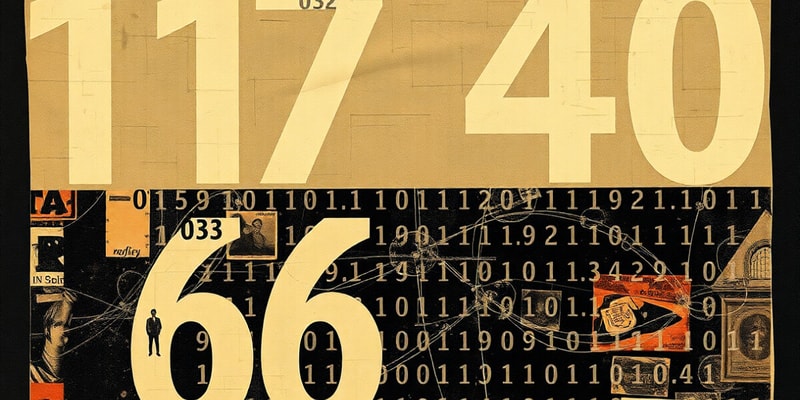Podcast
Questions and Answers
What is the primary function of computers and digital systems?
What is the primary function of computers and digital systems?
Which numeral system is characterized by the use of a single digit to represent numbers?
Which numeral system is characterized by the use of a single digit to represent numbers?
Which number system uses the digits from 0 to 9?
Which number system uses the digits from 0 to 9?
What symbols are used in the binary number system?
What symbols are used in the binary number system?
Signup and view all the answers
What does the Roman numeral 'IV' represent?
What does the Roman numeral 'IV' represent?
Signup and view all the answers
Why is understanding number systems foundational for various fields?
Why is understanding number systems foundational for various fields?
Signup and view all the answers
How are the numbers 1 through 6 represented in the unary system?
How are the numbers 1 through 6 represented in the unary system?
Signup and view all the answers
Which number system is considered the simplest for digital electronics?
Which number system is considered the simplest for digital electronics?
Signup and view all the answers
What is the binary representation of the octal number (705)8?
What is the binary representation of the octal number (705)8?
Signup and view all the answers
When converting the decimal number (31.4)10 to binary, what is the correct binary result?
When converting the decimal number (31.4)10 to binary, what is the correct binary result?
Signup and view all the answers
To convert the octal number (132)8 to hexadecimal, which binary groups correspond to the digits in hexadecimal?
To convert the octal number (132)8 to hexadecimal, which binary groups correspond to the digits in hexadecimal?
Signup and view all the answers
What is the decimal equivalent of the binary fraction (10.1011)2?
What is the decimal equivalent of the binary fraction (10.1011)2?
Signup and view all the answers
What is the first step in converting any random base number to another base?
What is the first step in converting any random base number to another base?
Signup and view all the answers
Which of the following represents the correct technique for converting octal to binary?
Which of the following represents the correct technique for converting octal to binary?
Signup and view all the answers
In binary, how is the decimal number (8.25)10 expressed?
In binary, how is the decimal number (8.25)10 expressed?
Signup and view all the answers
What is the binary representation of the decimal number (125)10?
What is the binary representation of the decimal number (125)10?
Signup and view all the answers
What is the binary representation of the decimal number 33?
What is the binary representation of the decimal number 33?
Signup and view all the answers
If you multiply $2^6$ by $2^{10}$, what is the result?
If you multiply $2^6$ by $2^{10}$, what is the result?
Signup and view all the answers
What is the value of 1AF in decimal?
What is the value of 1AF in decimal?
Signup and view all the answers
What is the octal equivalent of the decimal number 451?
What is the octal equivalent of the decimal number 451?
Signup and view all the answers
Which prefix indicates a value of $10^{-9}$?
Which prefix indicates a value of $10^{-9}$?
Signup and view all the answers
In binary addition, what is the result of adding 1 and 1?
In binary addition, what is the result of adding 1 and 1?
Signup and view all the answers
What does the value 1C3 represent in decimal?
What does the value 1C3 represent in decimal?
Signup and view all the answers
What is the binary subtraction result of 101000 - 100111?
What is the binary subtraction result of 101000 - 100111?
Signup and view all the answers
Which power prefix represents $10^6$?
Which power prefix represents $10^6$?
Signup and view all the answers
What is the equivalent value of 70 kB in bytes?
What is the equivalent value of 70 kB in bytes?
Signup and view all the answers
What number system uses digits from 0 to 7?
What number system uses digits from 0 to 7?
Signup and view all the answers
How many digits are in the hexadecimal number system?
How many digits are in the hexadecimal number system?
Signup and view all the answers
What is the positional value of the leftmost digit in the number 243 in decimal?
What is the positional value of the leftmost digit in the number 243 in decimal?
Signup and view all the answers
Which of the following correctly converts the binary number (101011)2 to decimal?
Which of the following correctly converts the binary number (101011)2 to decimal?
Signup and view all the answers
What is the octal equivalent of the decimal number 64?
What is the octal equivalent of the decimal number 64?
Signup and view all the answers
What is the binary equivalent of the hexadecimal number (2F)16?
What is the binary equivalent of the hexadecimal number (2F)16?
Signup and view all the answers
When converting hexadecimal (ABC)16 to decimal, the final value is:
When converting hexadecimal (ABC)16 to decimal, the final value is:
Signup and view all the answers
What is the process called to convert from decimal to binary?
What is the process called to convert from decimal to binary?
Signup and view all the answers
What is the least significant digit of the octal number (107)8?
What is the least significant digit of the octal number (107)8?
Signup and view all the answers
How do you calculate the decimal value of the octal number (77)8?
How do you calculate the decimal value of the octal number (77)8?
Signup and view all the answers
Which value represents decimal number 15 in hexadecimal?
Which value represents decimal number 15 in hexadecimal?
Signup and view all the answers
What is the radix/base of the binary number system?
What is the radix/base of the binary number system?
Signup and view all the answers
Which digit represents the most significant digit in the octal number (625)8?
Which digit represents the most significant digit in the octal number (625)8?
Signup and view all the answers
What does the binary conversion of (110)2 yield when expressed as an octal number?
What does the binary conversion of (110)2 yield when expressed as an octal number?
Signup and view all the answers
Study Notes
Number Systems Overview
- Computers and digital systems require methods to represent information for processing and storage.
- Number systems are mathematical notations for consistently representing quantities using digits or symbols.
- Foundational for disciplines such as computer science, electrical engineering, and information technology.
Common Types of Number Systems
- Roman Numeral System: Originated in ancient Rome, uses symbols like I, V, X to represent numbers.
- Unary Number System: Employs a single digit; numbers are represented by repeated instances of that digit (e.g., 1 as "1", 2 as "11").
- Decimal Number System: Most widely used, consists of ten digits (0-9).
- Binary Number System: Fundamental to computing and digital electronics, operates on two symbols: 0 and 1.
- Octal Number System: Base-8, utilizes digits from 0 to 7, often shorthand for binary (one octal digit = three binary digits).
- Hexadecimal Number System: Base-16, combines digits 0-9 with letters A-F; compact representation, one hex digit = four binary digits.
Radix/Base of Number Systems
- The radix (or base) denotes the unique digits in a system, influencing the positional value of each digit.
- Positional Notation formula: N = (an-1 an-2 ... a1 a0.a-1 a-2 ... a-m)r, where r is the radix.
Number System Comparison
- Example conversions showing how various numbers are represented in decimal, binary, octal, and hexadecimal systems.
Conversion Among Bases
- Essential for interpreting numbers across different numeral systems, facilitating easy translation especially between decimal, binary, octal, and hexadecimal.
Conversion Techniques
- Binary to Decimal: Multiply each bit by 2^n based on bit position.
- Octal to Decimal: Multiply each octal digit by 8^n.
- Hexadecimal to Decimal: Multiply hexadecimal characters by 16^n.
- Decimal to Binary: Divide by 2, keeping track of the remainders.
- Octal to Binary: Convert each octal digit to a 3-bit binary equivalent.
- Hexadecimal to Binary: Convert each hex digit to a 4-bit binary representation.
Fractions in Conversion
- Techniques exist to convert fractional binary to decimal (adding weighted binary values) and vice versa.
Power Notation
- Common prefixes for powers of 10 (e.g., pico-p, nano-n, giga-G) and powers of 2 (e.g., kilo, mega, giga) relevant in computing for memory estimations.
Binary Arithmetic
- Binary Addition: Add individual bits, propagating carries as necessary.
- Binary Subtraction: Account for borrows in bit subtraction, similar to decimal but adjusted for binary values.
Key Exercises
- Examples and practice conversions remain essential for mastering base transformations and arithmetic operations in different number systems.
Studying That Suits You
Use AI to generate personalized quizzes and flashcards to suit your learning preferences.
Description
This quiz covers key concepts related to number systems and code conversion within the context of Computer Architecture and Organization. Understanding these foundational elements is crucial for delving into digital systems. Test your knowledge on various counting techniques and their applications.




